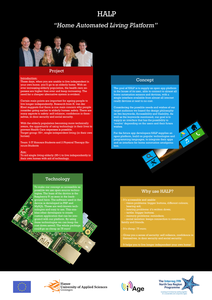In this document we present information about a test that we made to test SPOT with the RTK-GNSS and ROS2.
MULTIFILE

At present, persons with dementia and their family caregivers in the Netherlands are not adequately supported to modify their dwellings to match their personal needs. To facilitate aging-in-place for persons with dementia, a website was designed. The website was designed with persons with dementia and their spouses. In consultation sessions existing websites were discussed. Based on this discussion, a demonstration website was created and then discussed with and judged by the participants. Visits to the website were monitored using Google Analytics.
DOCUMENT

Industry 4.0 has placed an emphasis on real-time decision making in the execution of systems, such as semiconductor manufacturing. This article will evaluate a scheduling methodology called Evolutionary Learning Based Simulation Optimization (ELBSO) using data generated by a Manufacturing Execution System (MES) for scheduling a Stochastic Job Shop Scheduling Problem (SJSSP). ELBSO is embedded within Ordinal Optimization (OO), where in the first phase it uses a meta model, which previously was trained by a Discrete Event Simulation model of a SJSSP. The meta model used within ELBSO uses Genetic Programming (GP)-based Machine Learning (ML). Therefore, instead of using the DES model to train and test the meta model, this article uses historical data from a front-end fab to train and test. The results were statistically evaluated for the quality of the fit generated by the meta-model.
DOCUMENT
In discussions on smart grids, it is often stated that residential end-users will play a more active role in the management of the electric power system. Experience in practice on how to empower end-users for such a role is however limited. This paper presents a field study in the first phase of the PowerMatching City project in which twenty-two households were equipped with demand-response-enabled heating systems and white goods. Although end-users were satisfied with the degree of living comfort afforded by the smart energy system, the user interface did not provide sufficient control and energy feedback to support an active contribution to the balancing of supply and demand. The full potential of demand response was thus not realized. The second phase of the project builds on these findings by design, implementation and evaluation of an improved user interface in combination with two demand response propositions. © 2013 IEEE.
DOCUMENT

Friday 23rd March 2018 the first HiPerGreen semi-annual symposium took place at the newly opened World Horti Center in Naaldwijk. Participants in the form of students, professors and company representatives came together to share progress and ideas. Cock Heemskerk, lector Robotica, opened the event with a welcoming speech. Lucien Fesselet, assistant project manager, followed with general updates on the project. Then the floor was given to the students to present their results and progress. Pieter van der Hoeven, associate lector, presented on behalf of four graduating students from the Business, Finance and Law department the assignment on market research. The findings show great potential in business opportunity with the Orchid market. Amora Amir, a potential PhD researcher on big data, gave a speech on the usefulness and the need to understand big amounts of data. Lucien Fesselet performed a live flight demonstration to give an idea of the capabilities and the behaviour of the drone. After the risk analasys the sympoium was concluded with a drink.
DOCUMENT

Ageing-in-place is the preferred way of living for older individuals in an ageing society. It can be facilitated through architectural and technological solutions in the home environment. Dementia poses additional challenges when designing, constructing, or retrofitting housing facilities that support ageing-in-place. Older adults with dementia and their partners ask for living environments that support independence, compensate for declining and vitality, and lower the burden of family care. This study reports the design process of a demonstration home for people with dementia through performing a literature review and focus group sessions. This design incorporates modifications in terms of architecture, interior design, the indoor environment, and technological solutions. Current design guidelines are frequently based on small-scale studies, and, therefore, more systematic field research should be performed to provide further evidence for the efficacy of solutions. The dwellings of people with dementia are used to investigate the many aspects of supportive living environments for older adults with dementia and as educational and training settings for professionals from the fields of nursing, construction, and building services engineering.
DOCUMENT

Demonstration of a platform to aid single living elderly (55+) to live independently in their own homes with help of technology in Grimstad, Norway, June 2013.
DOCUMENT

Brief demonstration of how the Ecopath-with-Ecosim ecosystem models for the North Sea and Baltic Sea regions function within the MSP Challenge simulation platform
DOCUMENT
Summary:A novel Smart Charging strategy, based on low base allowances per charger combined with 1. clustering of chargers on the same part of the grid and 2. dynamic non guaranteed allowance, is presented in this paper. This manner of Smart Charging will allow more than 3 times the amount of chargers to be installed in the existing grid, even when the grid is already congested. The system also improves the usage of available flexibility in EV charging compared to other Smart Charging strategies. The required algorithms are tested on public chargers in Amsterdam, in some of the most intensely used parts of the Dutch grid.
DOCUMENT
